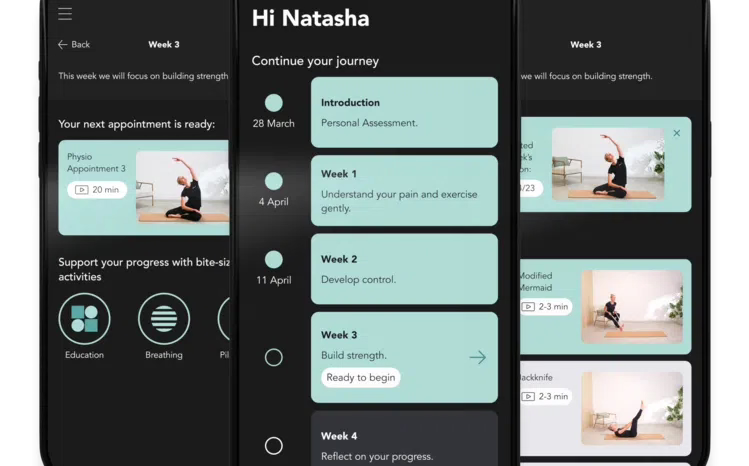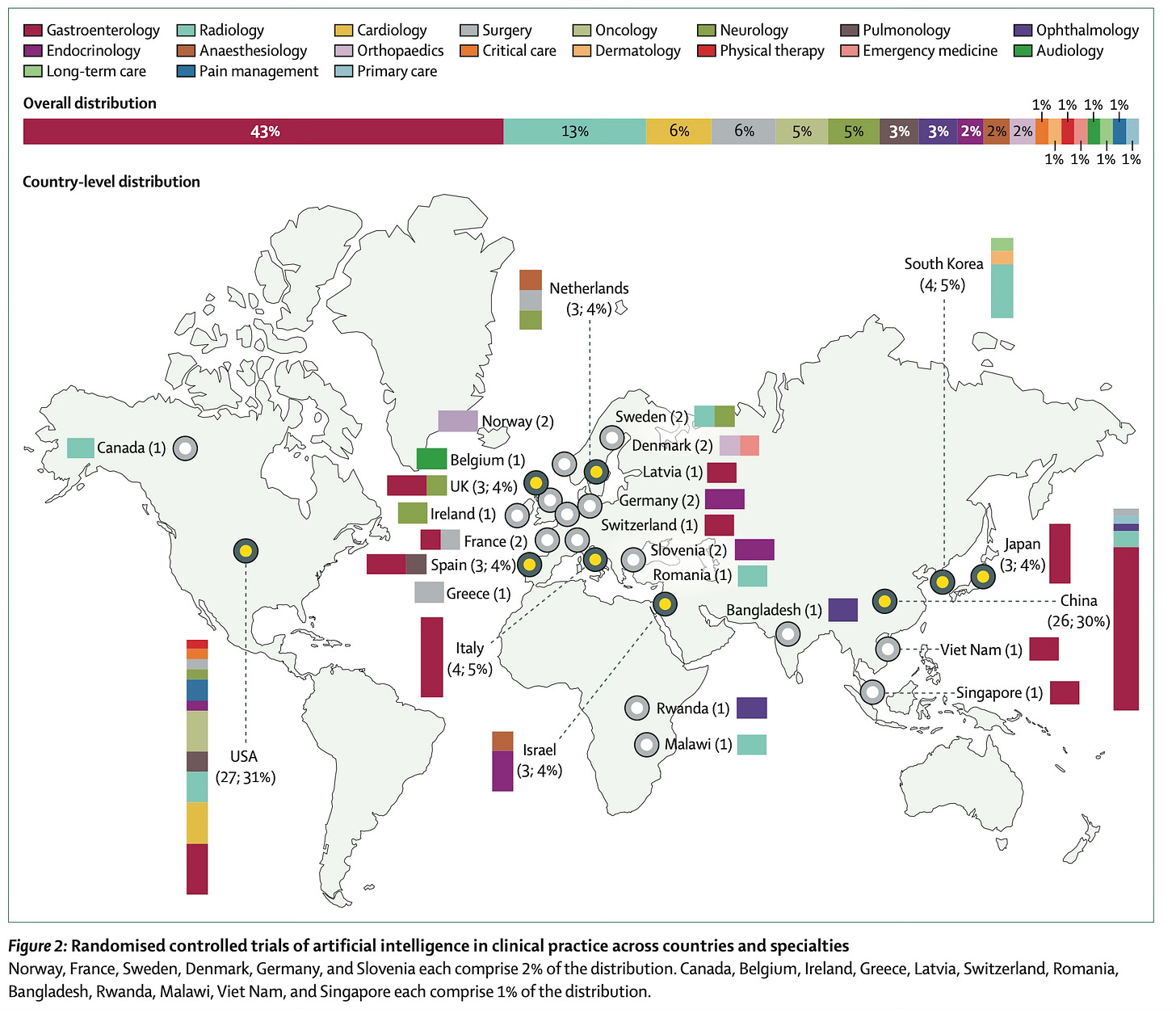🩺 The Pulse: Elevate Your Practice in 2025
Plus: Scotland's AI-powered physiotherapy clinic and the impact of 86 AI clinical trials.
1. Triage – Your Weekly Rundown
Hi Pulse Readers - this week, we’re focusing on:
how AI is transforming physiotherapy care in Scotland with NHS Lothian’s innovative pilot,
what 86 clinical trials reveal about the impact of AI in healthcare delivery,
and how you leverage AI tools like ChatGPT to achieve your New Year’s resolutions.
2. Case Study – Your Weekly Practical
Image Source: generated with Recraft.ai
Achieve your Practice’s New Year’s Resolutions with AI
Case Presentation: New Year’s resolutions can drive personal and professional growth, but busy schedules in healthcare make it difficult to stay on track. Whether you want to improve clinic efficiency, foster team well-being, or enhance work-life balance, LLM tools like ChatGPT or Claude can act as your planning assistant to help you take actionable steps.
Approach: Prompt an AI tool to break your resolutions into manageable tasks, optimise time management, and ensure steady progress throughout the year.
1. Set Professional and Personal Goals
Prompt Example:
"I am a [GP, practice manager, nurse, etc] at a busy medical centre in [country]. Help me set New Year’s resolutions for streamlining clinic workflows and improving staff morale. Also, suggest a goal to maintain a better work-life balance. I would like to especially improve my [fitness] [sleep] [stress management] [etc] this year."
Type “Regenerate” and refine as needed to create additional options.
2. Develop Actionable Plans for Practice Improvements
Prompt Example:
"I want to improve patient wait times and reduce admin workload. Create a step-by-step plan that excludes [technology upgrades, etc], but includes [staff training, etc]."
3. Build a Well-Being Strategy for the Team
Prompt Example:
"Suggest a weekly wellness program for my team, including short mindfulness sessions, healthy snack options, and team-building activities."
4. Track Key Metrics and Celebrate Achievements
Prompt Example:
"Create a system for tracking staff engagement levels. Suggest ways to recognise and celebrate milestones with the team."
5. Manage Time Effectively
Prompt Example:
"Provide tips for managing my time as a [GP, practice manager, nurse practitioner], including strategies for delegation and maintaining focus on high-priority tasks."
Outcomes: By integrating AI into your New Year’s resolution planning, you can balance personal well-being with professional goals, enhance clinic operations, and cultivate a supportive team environment. Make 2025 a year of growth and achievement for you and your practice!
3. The Pulse - Your Weekly Update
AI-Powered Physiotherapy Clinic Now Available in Scotland
Image Source: Flok Health
NHS Lothian has launched a large-scale pilot of an AI-powered physiotherapy clinic designed to provide personalised care to nearly one million patients across the region.
Based on video footage of human physiotherapists, the system replicates a structured video-call experience, offering rapid access to musculoskeletal (MSK) care.
Key Features:
CQC Approval: The solution is the first digital MSK clinic to be approved by the Care Quality Commission in the UK.
Patient Feedback: During earlier trials, 100% of patients rated their experience as equal to or better than with a human physiotherapist, with 86% reporting symptom improvement.
Streamlined Access: Patients can self-refer through NHS Lothian’s existing portals or be referred by participating GPs for same-day digital appointments.
Data Integration: The service links seamlessly with NHS systems, ensuring coordinated care and robust clinical and cost outcomes analysis.
Implications for the Health System and Clinicians:
This pilot highlights the potential of AI to address treatment delays and improve care accessibility. It also demonstrates a shift towards integrating digital solutions into routine clinical workflows. While promising, challenges such as ensuring long-term patient engagement, clinical oversight, and equitable access remain critical to address.
With plans to expand the service to other MSK conditions, solutions like Flok Health could redefine how physiotherapy is delivered at scale.
Evaluating AI’s Impact: What 86 Clinical Trials Reveal
Image Source: The Lancet Digital Health
A comprehensive review in The Lancet Digital Health analysed 86 randomised controlled trials (RCTs) assessing AI’s role in clinical practice, providing insights into its potential and limitations.
Key Findings:
Care Management Improvements: AI systems for insulin dosing and hypotension monitoring enhanced patient outcomes by increasing the time patients stayed within target glucose and blood pressure ranges. In oncology, AI-assisted radiation therapy and prostate brachytherapy showed reductions in acute care rates and tumour volumes.
Behavioural and Symptom Impact: Trials revealed AI-driven diabetic retinopathy risk predictions boosted patient referral adherence, while nociception monitoring systems decreased postoperative pain scores.
Clinical Decision Support: AI predictions on cancer mortality prompted more serious illness discussions between oncologists and patients. However, other trials, such as AI tools for atrial fibrillation stroke risk, showed limited impact on prescribing behaviour.
Implications for Healthcare Systems:
While AI shows promise in improving care management, enhancing patient adherence, and assisting in clinical decision-making, the variability in outcomes highlights the need for more robust, multicenter trials. To ensure effective integration, future research should prioritise patient-centred outcomes, equitable access, and transparent reporting.
Read the full review here.
4. Vitals – Quick Bytes
AI Advances Mammography Screening in Germany
Germany’s PRAIM study reveals that AI integrated into mammography screenings has improved cancer detection rates by 17.6%. Using AI for triage and safety net alerts streamlined workflows, reduced radiologist workload by 56.7%, and enhanced positive predictive values for recalls and biopsies. This large-scale implementation, over 460,000 screenings, underscores AI's potential to improve early cancer detection while maintaining accuracy and efficiency.
Explore the study here for more on its groundbreaking findings.
CHAI Releases Open-Source “Nutrition Label” for Healthcare AI
The Coalition for Health AI (CHAI) has launched an open-access model card on GitHub, offering a comprehensive "nutrition label" for healthcare AI algorithms. Designed to improve transparency, the card details key information like training data, bias mitigation strategies, and ongoing maintenance, enabling healthcare providers to assess AI models effectively. (fiercehealth.com)
We’d love to hear your thoughts, so join the conversation by leaving a comment below:
Stay tuned for more insights in next week's edition of The Pulse.
Have a great day & see you next week!
Your Hendrix Health Team






